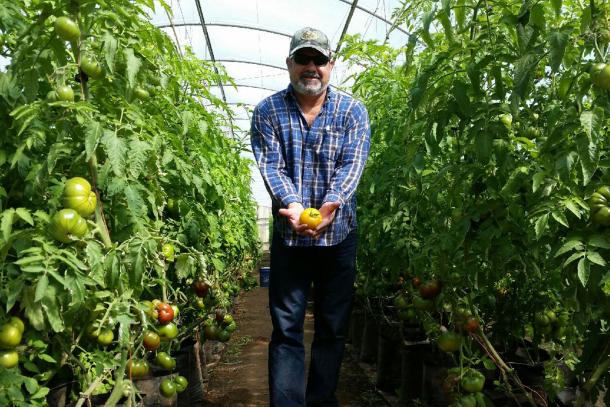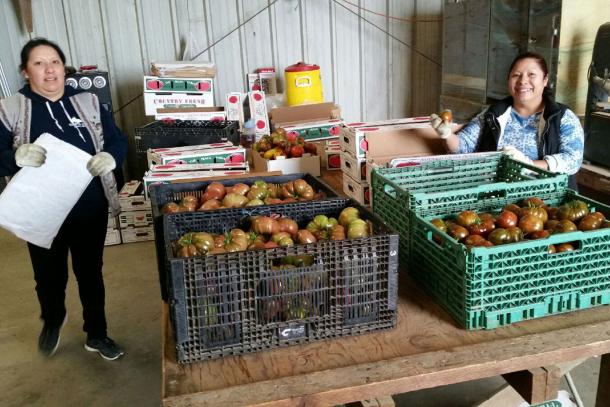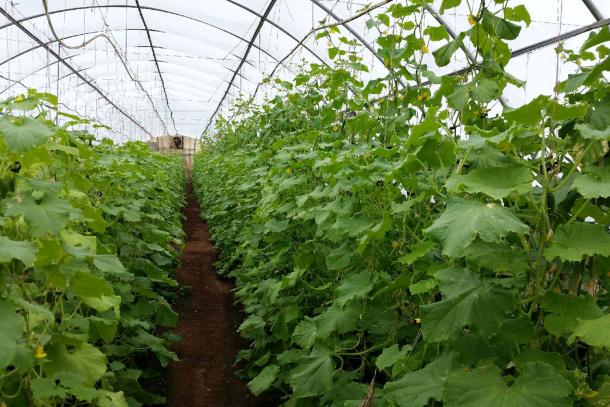Hothouse Tomatoes Pack Summer Flavor in the Springtime
Brie Mazurek, CUESA Staff
April 14, 2017

It’s April, and after months of carrots and kale, you’re probably itching for a sliced tomato in your salad or some fresh salsa for your chips. But if you’ve bitten into a supermarket tomato in the winter or spring, you know that they’re generally a bland, watery, and pale imitation of their summer counterparts.
There’s of course a reason: tomatoes don’t naturally grow year-round here, as they need warmth and sunshine to develop. The modern, industrial tomato that you find in most grocery stores is bred for appearance and durability, so it can be picked unripe and shipped long distances to feed America’s tomato addiction, no matter the time of year (or how lackluster the flavor).
Fortunately for us, Peach Farm and Elston Family Farm grow tomatoes in hothouses (heated greenhouses) to extend the season, and their vine-ripened tomatoes hit the farmers market this month, providing a sweet taste of the warm season ahead.
Indoor Tomatoes 101
California leads the country in summer tomato production, but most tomatoes you find in the winter and early spring are grown in Mexico or Florida. In the U.S., hothouse production is on the rise, giving hope for a more flavorful off-season tomato.
Some greenhouse tomatoes are produced hydroponically, getting their nutrients from a water solution rather than soil, but both Peach Farm and Elston Family Farm use a soil potting mix. To avoid pesticides, they release “beneficial insects” in the greenhouses to manage pests naturally, such as ladybugs to control aphids.
There are tradeoffs in hothouse farming; growing crops indoors in containers requires more labor and resources. To create the perfect environment, growers must maintain a balance of temperature, humidity, nutrition, and water. Hothouses are heated in the winter and cooled in the summer, making energy costs high. But for certain growers and tomato lovers, a ripe, locally grown spring tomato is well worth it.
Carrying On a Greenhouse Legacy
Ferry Plaza Farmers Market customers know Ed George of Peach Farm for his heirloom tomatoes, peppers, squash, and figs in the summer months. A third-generation farmer, Ed embarked on his own farming path in Yolo County in the 1970s.
This year, he’s at the farmers market several months ahead of his usual schedule. Last fall, he purchased 11 greenhouses from Nick and Jane Atallah of Madison Growers, another beloved Ferry Plaza original, expanding Peach Farm’s offerings and growing season.
Nick, an agriculture and water expert who taught at American University of Beirut in Lebanon and later worked with USDA, started Madison Growers with Jane in the 1980s when he retired. Over the years, they developed a loyal following for their flavorful, uniformly sized, and blemish-free hothouse tomatoes as well as Mediterranean and Japanese cucumbers.
Nick passed away in January from complications from myasthenia gravis, an autoimmune disorder, but he and Jane transitioned the business to Ed last year.
“As Nick’s health was declining, we contemplated selling the farm because we couldn’t keep it running,” says Jane. One day Ed approached them at the farmers market, having heard they were looking to sell. “He was interested and gave us a proper deal. He was already farming in that area, so it was a perfect fit.”
Extending the Season
Ed has started adding a few new varieties to the greenhouses, but for the most part, has kept the Atallahs’ operation as is, down to using Nick’s special proprietary potting mix. “Nick was a smart man and had everything dialed in,” he says. “For me to step in and take over what they worked for 28 years to accomplish means a lot.”
All of Madison Growers’ workers have continued on with Ed, including their greenhouse manager, Pepe, who has been with the farm for 18 years. As Ed learns the peculiarities of hothouse production, he is grateful for the steady stewardship of the experienced staff.
“I was out there yesterday, and everything is going on as Nick had established,” says Jane. “So the success is that what Nick developed continues. That’s his legacy.”

The transition has allowed Peach Farm to extend its market season, so that Ed can now supply customers with summer produce roughly nine months out of the year. “It makes our farm more complete,” he says. “We get in the markets a couple months earlier, then shift into summer produce, then pick up greenhouses again in the fall and keep the cucumbers going until Christmas.”
In a record-breaking year of rain, in which many farmers have had difficulties planting crops in muddy fields, having greenhouses offers some control and predictability. “It’s been raining, and you go inside these greenhouses and you still have ripe tomatoes. It’s like a different world in there,” says Ed.
Old Habits Are Hard to Quit
At Elston Family Farm, just north of Paso Robles, Dennis and Gaylo Elston and their daughter, Mary, have grown hothouse tomatoes and cucumbers for 20 years. The Elstons’ market season generally runs April through July, ending when field-grown tomatoes start hitting the market stands.
Gaylo can attest to the labor and delicacy it takes to nurture these crops to ripeness for peak flavor. “They’re like babies,” she says. “They have to be a certain temperature all the time—not too hot, not too cold.” The Elstons use grow lights and propane heating for their fledgling plants in the winter months, while in the summer their greenhouses are cooled with fans and evaporative cooling pads.
Neither Dennis nor Mary likes tomatoes, which makes Gaylo the resident taste tester. “Our tomatoes are sweet. I think it’s because we grow in dirt and not in water,” she says. Dennis prefers the cucumbers: “I’ll eat them for breakfast when I’m out there picking them.”
In this family operation, Mary manages much of the workload in addition to her full-time job, and Gaylo steps in as needed. Dennis, now 76, doesn’t foresee retiring until he needs to. “I’ve got a fold-back easy chair and a TV, but I’m afraid that’s where I’ll live and die if quit the tomatoes,” he says.
He recently replaced the plastic covers on the greenhouses, a major investment. “When you put on new plastic, then you’re in for another four or five years,” says Dennis. “It’s hard to quit. I’ve been at it a long time.”
Find Peach Farm on Saturdays and Thursdays, and Elston Family Farm on Saturdays at the Ferry Plaza Farmers Market.
Farm photos courtesy of Peach Farm.

